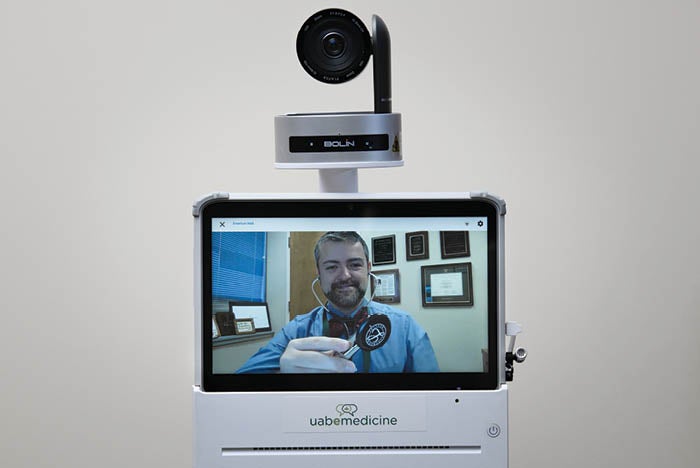System uses grant to expand telehealth

UAB has used some of the grant to help purchase 60 more telehealth carts.
Image courtesy of University of Alabama at Birmingham
The University of Alabama at Birmingham (UAB), the state’s largest health care provider, received a $1 million grant from the Federal Communications Commission (FCC) to help boost its telehealth and remote monitoring capabilities during the COVID-19 pandemic.
Eric Wallace, M.D., medical director of UAB eMedicine, says that 34% of the health system’s ambulatory visits are currently done via telehealth, and UAB recently passed 200,000 telehealth visits in the fall.
The system has used the funding in a number of ways, including a few critical infrastructure upgrades to expand its network capacity.
It also has added to its existing technology with 60 telehealth carts, 200 iPads and remote monitoring equipment for hundreds of patients, including those at risk of post-recovery complications after contracting COVID-19. The funding has also helped to keep patients and loved ones connected as isolation precautions are in place.
“It has gone to ensuring that patients can see their loved ones who are hospitalized,” Wallace says. “One of my favorite projects was ensuring that parents could see their children in the neonatal intensive care unit. Telehealth has been instrumental in ensuring the safety of our patients and providers.”
Areas of the system that benefit from the funding include intensive care, palliative care, emergency department and maternal emergency units.
Wallace explains that expenditures for three-quarters of the funding were made prior to the grant’s approval, and a portion of the funding will go toward paying back the cost for those early investments. The remaining quarter of the grant has gone toward securing a vendor contract for the health system’s remote patient monitoring services.
“Alabama has poor outcomes with regards to hypertension, diabetes, cardiovascular outcomes, etc.,” Wallace says. “The projects with remote patient monitoring will not only help to ensure care during COVID-19 but will improve care long term that is better than what the standard of care is currently.”
The funding is part of the FCC’s Wireline Competition Bureau. An award of $1 million was the maximum amount an organization could receive. Since the beginning of the FCC’s COVID-19 Telehealth Program, the agency has approved 539 funding applications in 47 states plus Washington, D.C., and Guam for a total of $200 million in funding — the amount of money provided by Congress in the CARES Act.




